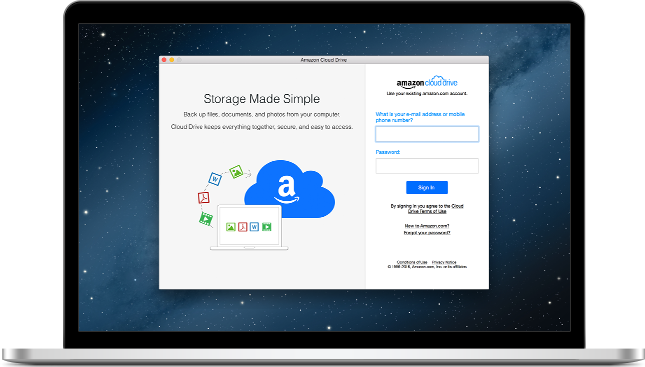
Report shows wide variation in privileged access management practices
As we reported yesterday, privileged users can represent a significant risk to enterprise security. A new report from cyber security company BeyondTrust underlines this with findings that show organizations adhering to best practices for privileged access management are much better at mitigating the risks of a data breach.
The survey of more than 500 IT, IS, legal and compliance experts split its overall scores into top- and bottom-tier groups and finds that top-tier companies were much more likely to have a centralized password management policy -- 92 percent in contrast with just 25 percent of bottom-tier organizations.

Amazon now offers Brits unlimited cloud storage
There are lots of cloud storage services available, offering varying amounts of free space, and additional storage for a fee. OneDrive, Google Drive, and Dropbox are all great services.
Amazon wants you to consider storing your files in its cloud, and today it introduces unlimited storage for people in the UK -- and you don’t have to be a Prime subscriber to get it.

Biometrics are less secure than passwords -- this is why
Many technology pundits talk about biometrics as the ultimate authentication solution -- the technology that will make the 'imperfect' password obsolete. Despite the hype, most companies are approaching with caution. In fact, CEB found that there are varied degrees of biometrics adoption globally, as around 20 percent of firms have actually deployed the technology.
A big reason for low adoption could be that they are less secure. And while many are touting the security of biometrics, there are four issues to consider when evaluating the technology.

Samsung Z2 is the world's first 4G Tizen smartphone
Android and iOS are the only two mobile operating systems that matter. That's a problem for consumers. Why? Well, while duopolies at least give them some choice, being limited to just two options isn't ideal. Sure, there are other options like Ubuntu for phones and Windows 10 Mobile, but neither are lighting the world on fire.
Consumers aside, phone manufacturers don't have access to Apple's iOS, leaving Android as the only viable option. In other words, for OEMs, there is almost no choice. Samsung is apparently not satisfied with being limited to Google's mobile operating system. The company has been experimenting with devices running a different Linux-based open source mobile OS -- Tizen. Today, it launches the first ever 4G smartphone running that OS. The catch? Besides a small 4 inch screen and 5 megapixel camera, it is only available in India.

Sony focuses on PC with PlayStation Now and DualShock 4 USB Wireless Adaptor
Sony's PlayStation line of home consoles have been wildly popular over the years. The fourth version, the PS4, is obviously the best from a hardware perspective, but overall the quality of games per console is matter of opinion. Obviously the PS4 will offer the best graphics, but from a gameplay and enjoyment perspective, hardware is not the final word.
Today, the console maker takes a strange turn by focusing on the PC. You see, it is bringing its existing 'PlayStation Now' cloud gaming service to Microsoft Windows. This will give PC gamers the opportunity to play some PlayStation titles on their gaming rigs. In addition, Sony is delivering a USB dongle for Windows and Mac which will enable the DualShock 4 to be used on computers running those operating systems.

Windows 10 cumulative updates rolling out for Anniversary Update
The Windows 10 Anniversary Update hasn’t gone as smoothly as Microsoft would have liked. Despite extensive testing from Windows Insiders, users have reported problems with the OS causing their systems to freeze, reinstall previously removed apps, and kill webcams.
Microsoft is today pushing out two cumulative updates that bring the Anniversary Update to 14393.82.

I've switched from Amazon Fire TV to Roku 3 and I like it... for now
Its been two and half years since I parted ways with DirecTV. It wasn't them, I honestly loved the service, but I was paying for countless channels I never watched. I replaced it with Hulu Plus and Sling TV and now pay much less for fewer channels I don't watch. I have the same few I flick between, but without al-a-carte this is the best I can do.
Recently a system problem eliminated one of my options -- not the TV channels, but how I view them. I'd been predominantly using an Amazon Fire TV along with a Harmony remote. The remote stopped connecting to its hub and no fix I could think of worked. The batteries in my Fire TV remote were dead and I had no spare AAA ones lying around. Similarly, the Roku 3 batteries were also history, but I did have the required AA ones.

Microsoft launches 'Xbox One S Madden NFL 17 Custom Console Sweepstakes'
The Xbox One is the best console of the current generation -- according to me, that is. Of course, some folks -- such as my colleague Wayne Williams -- think that PlayStation 4 is best. This is hardly an argument that will end anytime soon. Look, the PS4 is cool, but Microsoft's console runs Windows 10, making it have, arguably, more potential -- am I right? Oh well, to each his/her own.
Microsoft recently released the more powerful and svelte 4K capable Xbox One S and I totally want one -- I am sure you, dear readers, want one too. Luckily, if funds are tight, you can maybe win one from the Windows-maker. Microsoft is giving away 32 customized NFL consoles -- each featuring the logo of one team -- which will be extremely rare. Why? Because they will not be sold -- the limited consoles are exclusive to this sweepstakes!

Microsoft reveals the secrets of HoloLens' specs, including a 24-core processor
At the Hot Chips conference this week, Microsoft has shed some light on the hitherto secretive specifications of its augmented reality HoloLens. Now that anyone with $3,000 spare is able to buy a headset, there's never been more interest in what's actually inside the case powering the AR goodness.
The holographic processing unit (HPU) at the heart of HoloLens is a seriously multi-cored beast. The Register reports that it is a "TSMC-fabricated 28nm coprocessor that has 24 Tensilica DSP cores". Of course, there's much more to the device than just this chip.

New tool helps cut Agile software project delays
Delays to software projects are frequently blamed on missed or misunderstood requirements. As companies look to ensure the successful delivery of Agile IT projects, they need tools that help ensure business needs are met.
Toronto-based Blueprint Software is launching a new Storyteller add-on for the JIRA bug tracking tool, that allows developers to automatically generate user stories, acceptance criteria and tests, ensuring that user requirements are properly addressed.

Opera VPN launches for Android, adds network security check
Three months after unveiling Opera VPN for iOS, browser developer Opera Software has launched Opera VPN 1.0 for Android. The Android build offers the same functionality as the iOS version -- secure VPN encryption to the web (with support for spoofing one of five countries), plus the blocking of both ads and tracking cookies. It also offers one extra feature not (yet) present in Open VPN for iOS: a tool for determining the security of the current network.
Virtual Private Networks provide users with a secure network connection over any internet connection, including insecure networks such as public Wi-Fi hotspots. VPNs can also be used to trick websites into believing the user is connecting from a different country to the one they’re in, helping bypass geographic restrictions.

The hidden security risk of privileged users
All businesses are aware of the danger posed by insider threats, but those threats are multiplied when they involve privileged user accounts.
Damage caused by privileged users is the most extensive, the hardest to mitigate and the hardest to detect as it involves authorized users doing things they are authorized to do. A new report from access management specialist Forcepoint in conjunction with the Ponemon Institute looks at the gap between organizations' awareness of the problem and their ability to solve it.

Track your AdSense earnings with Auburn
Are you earning so much with Google AdSense that you’re always online checking your balance? OK, probably not, but if you’re earning something then tiny Windows freebie Auburn could save you time by displaying your earnings in a system tray icon.
If you’re doing implausibly well, it’s possible to have the program check your balance on a regular basis, display a tooltip and play an audio alert when new money arrives.

Hacked: Epic Games forums
Reusing a password on multiple sites is a recipe for disaster. Why? Well, the password is now only as safe as the weakest site. For example, if you use the same user credentials for a shopping site that you do for a banking site, and the shopping site is hacked, your banking password is now exposed. Bad guys will try stolen credentials on various sites looking for where they might work.
Today, Epic Games, maker of popular games like Unreal and Infinity Blade, announces that its forums have been hacked. Now, if you don't reuse passwords, that isn't a huge deal, right? Sort of. True, your discussions about games might not be particularly sensitive, but you may still feel pain.

New Huddle release improves security and control
Business collaboration tools are increasingly essential in the enterprise, but they need to keep content secure, especially in professional services environments that handle sensitive client data.
Collaboration specialist Huddle is tackling this with the launch of its Unified Authentication Portal. Using a single sign on, this lets account managers apply policies across Huddle's web, desktop and mobile apps in one step, simplifying the process of keeping content secure.


